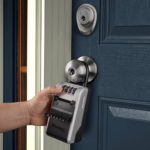Steps to Take Before Contractors Begin Work on Your Home

Achieving your dream home through a remodeling project is an exciting prospect. Just ask the 55% of homeowners who reported renovating a part of their home in the past year.
As eager as you are for the work to get started, taking the time to ensure the job is done smoothly, safely and securely is important. Before contractors begin, take the following steps first:
1. Ensure that any contractor working on and having access to your home is adequately insured and bonded should there be a mishap, injury on site, or damage to your property. It is appropriate to ask for your contractor’s license as well as proof of insurance, coverage limit details and a lien waiver.
2. Read the contract carefully and ensure it includes a construction schedule, detailed hard and soft cost estimates, and any other information that may be required by your city’s building inspection department, such as construction drawings or permitting plans.
3. Make a good investment by checking references and reviewing any Better Business Bureau ratings or complaints that have been filed against the company. Some states also provide public access to civil and small claims cases that have been filed against companies or individuals. This is important, considering homeowners spend significant sums to renovate their spaces according to their vision. In fact, the Joint Center for Housing Centers of Harvard University estimates that Americans will spend $485 billion on home improvement projects in 2023.
4. You can’t be there at all times to let in contractors. Certainly, don’t start giving out your garage door code or leaving your door open — this comes at high risk for theft. Instead, invest in a versatile lock box for which only you control the combination so you can grant access to a particular contractor on a given day, and then change the combination for the next need or worker. From the front door to the pool gate to the storage shed, find lock boxes that fit your project’s needs. The newest models from Master Lock include #5480D, which features a removable shackle for easy installation in many locations; #5481D, which is wall-mountable, and #5482D, which features a removable cable that provides flexibility to secure it in hard-to-reach and discreet locations. All feature double the storage capacity to accommodate keys, fobs, garage door openers or key cards in all shapes and sizes.
“We studied customers’ needs and reimagined our product solution to provide bigger, easier to use lock boxes that work for any door, piece of property or access point,” says Becky Fellows, senior category manager at Master Lock. “And after the remodel, you can repurpose it to provide a dog walker or short-term renter access to your property.”
5. Make a plan for pets. This could be as simple as using gates to separate them from construction. However, if the project is kicking up dust and debris, or your pet is sensitive to loud noises, consider having them stay elsewhere, whether that’s with friends or at a pet hotel.
6. Protect your property and make life easier for your contractor by clearing their work area of furniture and other items. Determine whether you’ll relocate these items to rooms not being remodeled, store them in the garage or shed, or use a third-party storage space.
No matter the size of your home project, if contractors are involved, you’ll want to ensure they are up to the task, and that your home is prepared for their arrival.
 Blooms and Characters: Exploring the Enchanting Topiaries of the 2024 EPCOT International Flower and Garden Festival
Blooms and Characters: Exploring the Enchanting Topiaries of the 2024 EPCOT International Flower and Garden Festival Costco’s Grand Debut Marks a Milestone for Daytona Beach
Costco’s Grand Debut Marks a Milestone for Daytona Beach Royal Caribbean’s Utopia of the Sea Sets Sail in Summer 2024: A Luxurious Seafaring Escape
Royal Caribbean’s Utopia of the Sea Sets Sail in Summer 2024: A Luxurious Seafaring Escape Demystifying Insurance to Ensure Proper Coverage
Demystifying Insurance to Ensure Proper Coverage Steps to Take Before Contractors Begin Work on Your Home
Steps to Take Before Contractors Begin Work on Your Home 3 Ways to Take the Stress Out of Holiday Hosting
3 Ways to Take the Stress Out of Holiday Hosting 5 Tips for Picking a Health Plan This Open Enrollment Period for 2024
5 Tips for Picking a Health Plan This Open Enrollment Period for 2024 It is the Season for Scams: 5 Ways to Protect You and Your Family
It is the Season for Scams: 5 Ways to Protect You and Your Family Why You Should Care About Your Skin Health This Winter
Why You Should Care About Your Skin Health This Winter Phantom Rovo Massage Chair
Phantom Rovo Massage Chair